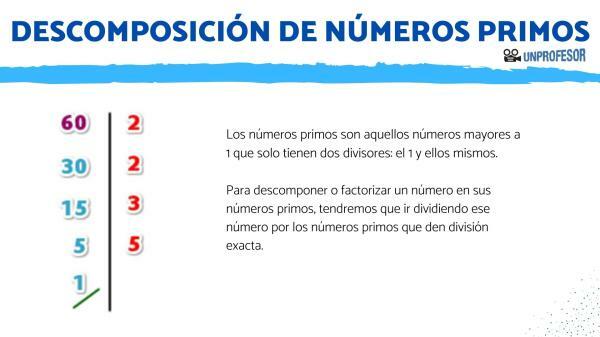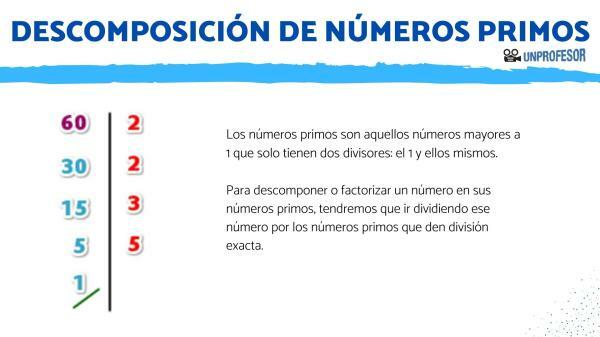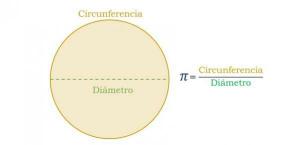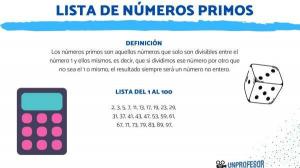Decomposition of prime NUMBERS

Welcome to this new lesson from a Teacher, in which we are going to deal with the decomposition of numbers into factors, better known as decomposition of prime numbers. First of all, we will remember what the prime numbers were and what they were. Next, we will analyze how to decompose a number in prime numbers by means of an example. At the end of the lesson an exercise with its respective solutions will be provided. Let's go there!
Before discovering what the decomposition of prime numbers is like, let's define the term well. The Prime numbers are those numbers greater than 1 that only have two divisors: 1 and themselves.
That is, they are numbers that can only be divided by 1 or themselves so that the remainder is zero or, what is the same, so that the division is exact.
The prime numbers from 1 to 100 are: 2, 3, 5, 7, 11, 13, 17, 19, 23, 29, 31, 37, 41, 43, 47, 53, 59, 61, 67, 71, 73, 79, 83, 89 and 97 .
To decompose or factor a number into its prime numbers, we will have to divide that number by the prime numbers
that give exact division. To understand it better, let's see it with an example: decomposition of the number 300 into prime numbers.- We always start by dividing by the first prime number in the list: 2. 300 divided by 2 gives 150.
- We keep dividing by 2 until it doesn't give us exact. 150 divided by 2 is 75, but 75 divided by 2 is no longer exact, so we move on to the next prime number: 3.
- We divide 75 by 3 and it gives us 25. If we divide it again by 3 it does not give us an exact number, so we go on to the next prime number: 5.
- We divide 25 by 5 and it gives us 5. Since 5 is already a prime number, we divide it by itself and it gives us 1.
- We always have to end up with 1 as the result.
- To recap: we have divided by 2 twice, by 3 once, and by 5 twice, so the decomposition of 300 is 2 x 2 x 3 x 5 x 5. It can also be expressed with powers: 22 x3 x52.
Tricks to decompose into prime numbers
- To find out if a number can be divided by 2, you have to look at whether it ends in an even number or in 0.
- To find out if a number can be divided by 3, you have to make sure that the sum of its digits is a multiple of 3.
- To find out if a number can be divided by 5, you have to look at whether it ends in 0 or 5.
To confirm that you have understood what has been explained in this lesson about prime numbers, we recommend that you solve the following exercises:
- 1. Break down the number 147 into prime numbers.
- 2. Break down the number 3,125 into prime numbers.
Let's see the solutions to the exercises raised in the upper section.
1. Break down the number 147 into prime numbers.
- 147 divided by 2 is not exact, so we skip it.
- 147 divided by 3 is 49.
- 49 divided by 3 is not exact, so we go to 5.
- 49 divided by 5 is not exact, so we go to 7. 49 divided by 7 is 7.
- Since 7 is already a prime number, we divide it by itself and we are left with 1 as a result.
- Thus, the decomposition of 147 is: 3 x 7 x 7.
2. Break down the number 3,125 into prime numbers.
- 3,125 divided by 2 is not exact.
- 3,125 divided by 3 is not exact.
- 3,125 divided by 5 gives 625.
- 625 divided by 5 gives 125.
- 125 divided by 5 gives 25.
- 25 divided by 25 equals 5.
- Since 5 is already a prime number, we divide it by itself and it gives us 1.
- So, since we have divided five times by the number 5, the decomposition of 3,125 is 5 x 5 x 5 x 5 x 5.
If this lesson has helped you better understand how a number breaks down into prime numbers, don't hesitate to share it with everyone who will find it useful, such as your colleagues and colleagues class. Also, remember that you can continue browsing the web tabs and read many other interesting lessons.




